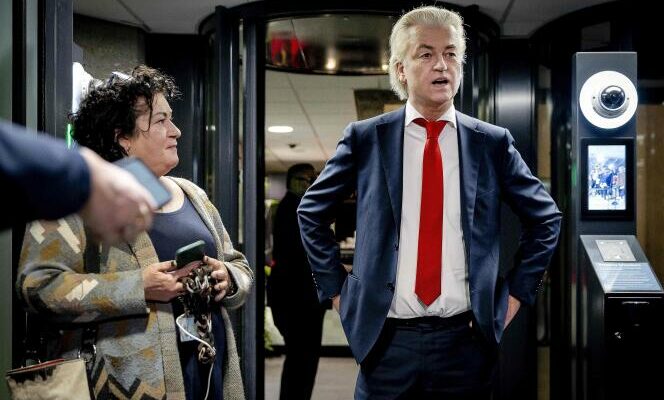IHe had strategically put aside his most radical comments on the closure of mosques, the ban on the Koran or asylum policy. Two weeks after his victory in the legislative elections, the Dutch populist Geert Wilders, however, went on November 28 to support demonstrators who were protesting in The Hague against the accommodation of asylum seekers in a hotel. “I am not going there as prime minister, but as leader of the PVV [Parti pour la liberté], he explained. I’m proud to meet people who have problems, who have been robbed [les contribuables qui financent cet hébergement, selon lui]. »
The man who came first in the poll by capturing a quarter of the votes on November 22, and who intends to lead the Netherlands, therefore showed that he remained, first and foremost, an extremist agitator, at the head of a party which is not one – the PVV has only one member, Geert Wilders himself –, has no framework and no relay, and which also does not have the slightest experience of power at any level. The Freedom Party? “A little electric train that has been running in circles in a living room for fourteen years and suddenly finds itself connected to 220 volts”quips writer Geert Mak.
However, after Italy, here is another founding country of the European Community likely to be, tomorrow, led by the extreme right. In this falsely peaceful kingdom, the fire had actually been smoldering for more than twenty years. The populist Pim Fortuyn was the first to light the fuse, by connecting a muted popular dissatisfaction with political leaders with a rejection of foreigners which would fuel nationalist rhetoric.
Armed with his eternal smile, his great popularity and unfailing ideological flexibility, the liberal Mark Rutte, at the head of four coalitions since 2010, had been able to confine the far right to a purely protest role. The Prime Minister also had a real conviction, based on his experience: it was, according to him, impossible to govern with Mr. Wilders. As proof, the rapid failure of his first government, in 2012, quickly torpedoed by the PVV, which had promised him support “à la carte” in Parliament. This “politics of tolerance”as the Dutch call it, is back on the agenda.
Strategic error
After having made a strategic error at the start of the campaign, Dilan Yesilgöz, the resigning Minister of Justice, who succeeded Mr. Rutte at the head of the liberal party, is trapped. His unfortunate remark – since corrected – on the possibility of governing ” possibly “ with Mr. Wilders had a double consequence: it legitimized the extreme right, and it therefore led to the flight of a significant part of the liberal electorate towards the PVV. Coupled with the collapse of the centrist parties and the inability of the “red-green” left to make a counter-speech heard, this blunder enabled a success that surprised even Mr. Wilders himself.
You have 50% of this article left to read. The rest is reserved for subscribers.
